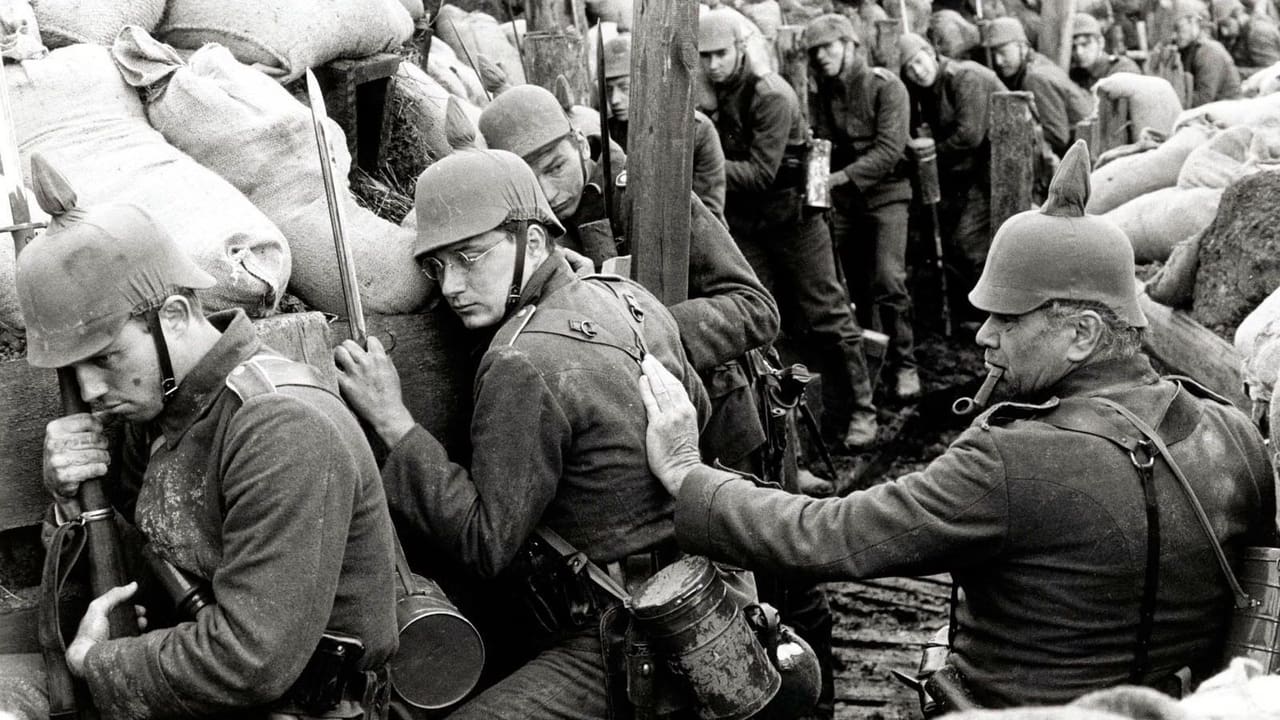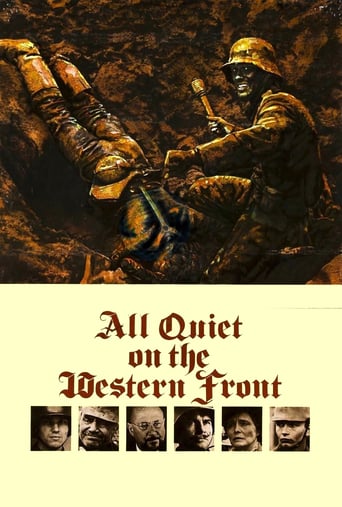Incannerax
What a waste of my time!!!
Breakinger
A Brilliant Conflict
Ezmae Chang
This is a small, humorous movie in some ways, but it has a huge heart. What a nice experience.
Cassandra
Story: It's very simple but honestly that is fine.
donbrown-16800
I really can't say this enough times before I start my review -- ITS NOT A REMAKE OF THE 30's FILM -- its a film that stands on its own.Both films tell the story of the 1929 book, but equally both films are set in different time periods so this is more of an updated version of the story and so by definition a different film. They are retelling the story with a more modern perspective. I like both versions very much but I just find this one a little more to my tastes. The acting is good - no overacting, the locations are excellent, a wonderful musical score, it just feels more realistic than the 1930's film. That's all I can say.
Emil Bakkum
The Second World War was undoubtedly the most gruesome war ever, but it is the First World War that appeals most to the imagination when reflecting upon the horrors of war. After WWI war has never again been the same. With "Im Westen nichts Neues" Remarque wrote an outstanding account of the misery in the trenches. However, there are many similar novels from that episode. Just from the German side we have "In Stahlgewittern" (Juenger), "Der Mensch ist gut" (Frank), "Der Wanderer zwischen beiden Welten" (Flex), "Jahrgang 1902"(Glaeser), which I read all. The French and English authors have produced similar works. The best possible recommendation of the film is probably, that it closely follows the narrative and the atmosphere of the book. The only critique is perhaps, that it is an English-spoken produce, and so the typical German expressiveness is lost. But what the heck, war is universal. The story is told from the view of Paul Baumer. In 1914 he volunteers together with 20 of his classmates. They are all fine young men, students filled with hopes of a bright future. The chance to spread German civilization fills them with pride, and they glorify the approaching victory. At the front in France they soon discover the gruesome reality. They are confronted with the terrible routine in the trenches. They suffer from the continuous shelling with shrapnel, which kills all living nature, and is invariably followed by the next useless offensive. During the first months they gladly participate in the rush on the enemy barbed wire, shouting "Hurrah!" while being gunned down by the machine gun holes. Soon the school class experiences the first casualties, comrades dying by splinters in their stomach or severed limbs. They fade in the trenches, crawling in the mud and the dirt, hungry and sick in an environment where every sign of beauty has been wiped out. At the end Baumer writes: "Of our group of 20 men, 13 are dead, 4 are missing and 1 has got insane". Anyway, this is about the whole story. The film inspection puts the minimal age for the film at 16, but nevertheless it would be wise to present it in schools. A highly emotional aspect is the proximity of the conflict, since apart from the perpetual anonymous shelling it is still largely a man-to-man fight with drawn bayonets and experimental flame-throwers. You can yet by accident find yourself in a bomb crater, together with an armed enemy volunteer. The offensive is not yet reduced to the status of a computer game. It also helps to place the film into the context of military history. In the nineteenth century the war was still the sovereign right of the absolute ruler. Many intellectuals considered war to be a purifying experience for the people. It was in WWI, that the technological progress began to allow for mass slaugther. Of course the artillery had become highly effective, but there were also the airplanes, the poisonous gas, the first armoured cars and tanks, flame-throwers, machine guns etc. Surgery advanced dramatically. The mass destruction reached proportions, that surpassed the contemporary human imagination. Man lost what had remained of his innocence. It was this war, that ended the remaining absolute monarchies and even caused the birth of an entirely new society system in Russia. It created the first insane forms of art (Dada), and strongly furthered the foundation of pacifism and the League of Nations. You must see this film: not because of the acting or the nice shots, but because you have to know.
gcd70
Patchy remake of the classic Academy Award winning film of the 30's. Delbert Mann's feature fades in and out from the inspired to the flat, and back again. Mostly though, it is the latter of these two levels that it sticks to.Mann, along with screenwriter Paul Monash, was unable to recreate the simple, understated force of Lewis Milestone's anti-war picture. The first movie was years, perhaps fifty years, ahead of its time. The second is merely a reminder of how good the first one was.As the easy going, compassionate Paul Baumer, Richard Thomas does a good job. Cleverly cast in the Louis Wolheim role, and even more eye-catching, is Ernest Borgnine as war-weary veteran Katchinsky. Hopelessly miscast though, is the immensely talented Ian Holm as the heartless Corporal Himmelstoss. Donald Pleasance and Patricia Neal also star.A shame that this, a reasonably good film, had to be overshadowed by its predecessor. John Coquillan photographs Czechoslovakia and some convincing sets very well.Friday, January 29, 1999 - Video
Il-vino-e-lacqua
Granted I've never seen the original - I do have that unfortunate problem of being unable to relate to films made in a very young time.Nevertheless, I did grow up during the "Golden Age Of TV Movies" and I never saw this on television. There was a teacher that kept airing it when I was working in the A/V Lab. I didn't care about that.Well I was old enough to take note. Now I think this is probably the Best Made For Television Movie of all time.The Great War (or World War I) is a war that I believe is immensely ignored in the scheme of the 20th Century. I was one of those people that heard pretty much everything about WWII and I can recite it backwards and inside-out.But the thing about the situation in Europe needs to be looked at more seriously and in a long amount of time. WWII didn't just pop out of nowhere.I'm going to tell you to know the 20th Century you need to research "The Great War" and "The Franco-Prussian War".But if you want to only find out how the Industrial Revolution turned war into a total, complete killing factory World War I is where it all started.And if you research further, most people didn't really know what they were fighting for and/or who.Young men were asked to go fight to keep up the status quo. That's basically about all you can say about ANY war.That's what this movie is about; young me going to war and dying and the tragic circumstances. It's an endless theme.

